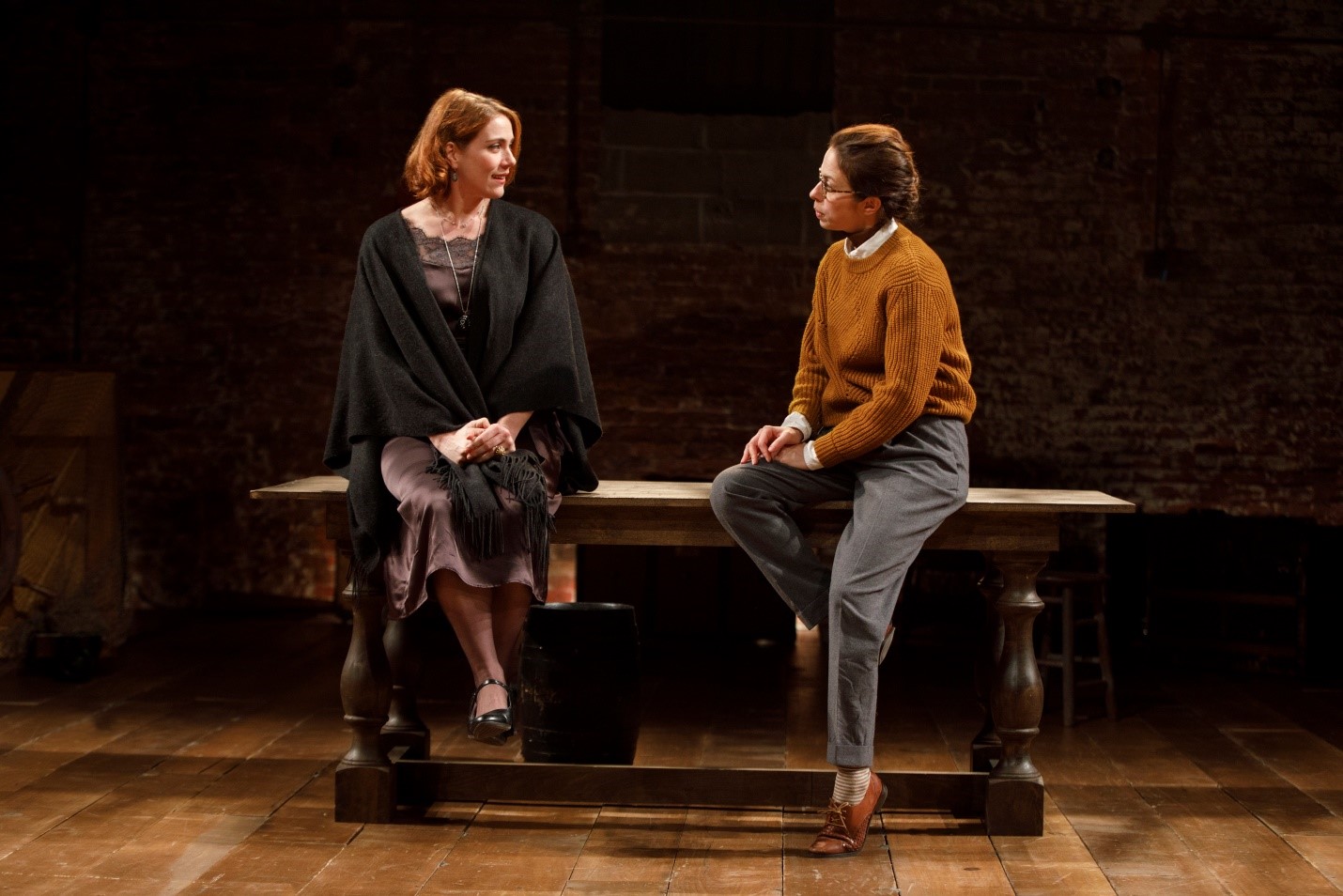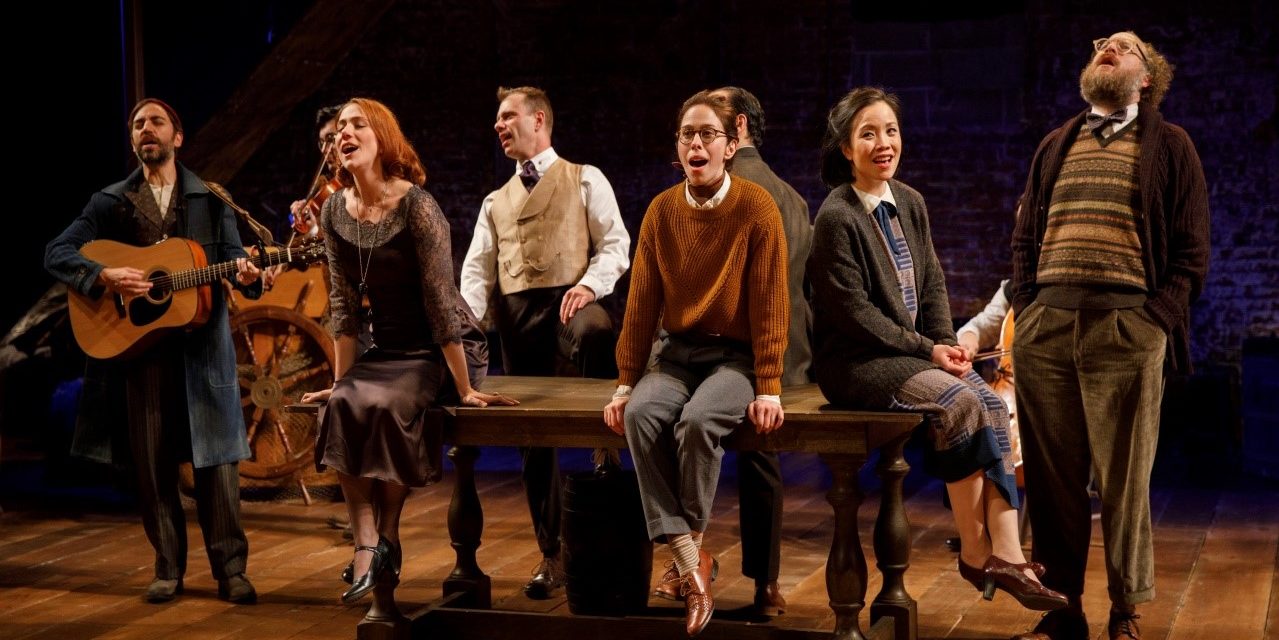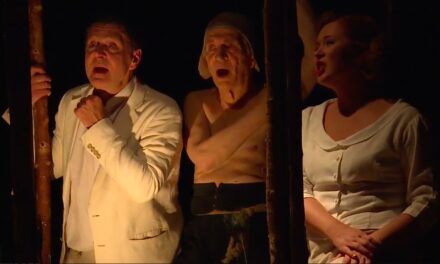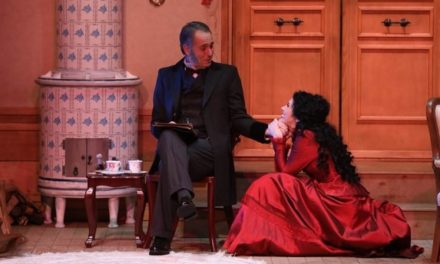Fiasco Theater begins its experimental take of William Shakespeare’s Twelfth Night, Or What You Will by adding a musical number to dramatize Viola and Sebastian’s shipwreck. While dramatizing the shipwreck has been done before (for example, in Trevor Nunn’s film version) to insert an introductory scene to a staged production of a beloved classic play is an artistic risk that could flop badly. In this case, the shipwreck scene adds insight into how Shakespeare counted on the gloom induced from a shipwreck to bolster the comedy in Twelfth Night. The rub (tenfold): the playwright’s contribution is limited to the script no matter how brilliant.
When Viola washes up to shore in Scene Two, she is fortunate to get news right away that Sebastian did not go down with the ship. He was seen by rescuers riding a wave towards land. (Sebastian is not so lucky and must assume Viola is lost at sea until they meet later on in Illyria.) Emily Young, as Viola, seems unusually composed for a young woman who just survived a shipwreck. This leads to a moment of doubt about her character portrayal, but the doubt passes quickly. Young portrays Viola as a serious young woman who keeps her emotions at bay. This approach to the role allows Young to convey, as asides to the audience, that her affection for the Duke is constant, while she maintains, in earnest, her cover as his male confidant to do his romantic bidding with Olivia.
Olivia, of course, has no interest in the Duke whatsoever. Olivia is mourning her brother’s death for a long time and this is her public reason to reject Orsino. She falls in love with Viola pretty much at first sight, thinking her a man named Cesario. Shakespeare again finds the humor that faced with tragedies beyond our control, it is human nature to instinctively search for happiness by looking for love, and to often find the attempt is unreciprocated. Fools in love is a recurring theme for witty banter in Twelfth Night–who is the fool, who is not the fool.

Photo by Joan Marcus.
As Viola’s disguise as a man gives the play its first and foremost ruse, Fiasco Theater capitalizes on the potential for costumes to step up the comic mayhem. Twelfth Night was initially performed in 1601, but the characters in Fiasco Theater’s production wear fashions from the early 20th century. It is as if the ensemble journeyed in a time machine that had its year dial wrong, and no one bothered to correct it. For good reason: the costumes are fabulous, the time period works, and the silliness is infectious as each new period costume is introduced.
Determined to ruin everyone’s revelry, Malvolio is the rightful villain in Twelfth Night. It is an interesting twist though that Sir Toby Belch, Sir Andrew Aguecheek, and Maria’s deceit, to lead him to believe Olivia is in love with him, digresses from amusing to sinister; how their cynical plot unfolds is a somber reminder that there are no heroes in this play. Malvolio encountering Olivia after being tied up and held against his will is a particularly effective scene. Or, to be more precise, it is a moving conclusion to several hilarious slapstick scenes that occur after the intermission.

Photo by Joan Marcus.
Jesse Austrian as Olivia, Noah Brody as Orsino, and Andy Grotelueschen as Sir Toby Belch seem perfectly cast in their roles. True to the spirit of an ensemble, each of the actors in supporting roles adds comic expertise to the production. Paco Tolson, as Sir Andrew, and Paul L. Coffey, as Malvolio, steal a scene or two. Ben Steinfeld is co-director with Brody as well as musical director. As Feste the clown, he sings beautifully and does a stand-up job leading the cast and audience in song.
“If music be the food of love, play on” –Orsino, Scene One
Passenger baggage and ship parts salvaged from the shipwreck are strewn across the stage in surreal arrangements, custom-designed scene to scene. While the main characters of Twelfth Night are lucky in love and pair up successfully, the ensemble’s commitment to remember the shipwreck throughout the production, even when the story ends well, feels like a warm embrace to the audience when life can, often times, feel unpredictable and rife with danger.
This post was written by the author in their personal capacity.The opinions expressed in this article are the author’s own and do not reflect the view of The Theatre Times, their staff or collaborators.
This post was written by Heather Waters.
The views expressed here belong to the author and do not necessarily reflect our views and opinions.


















